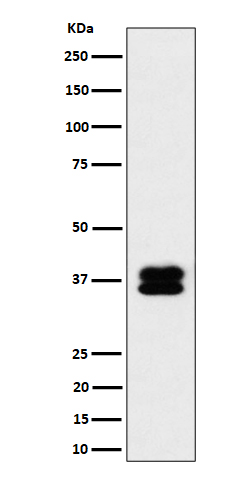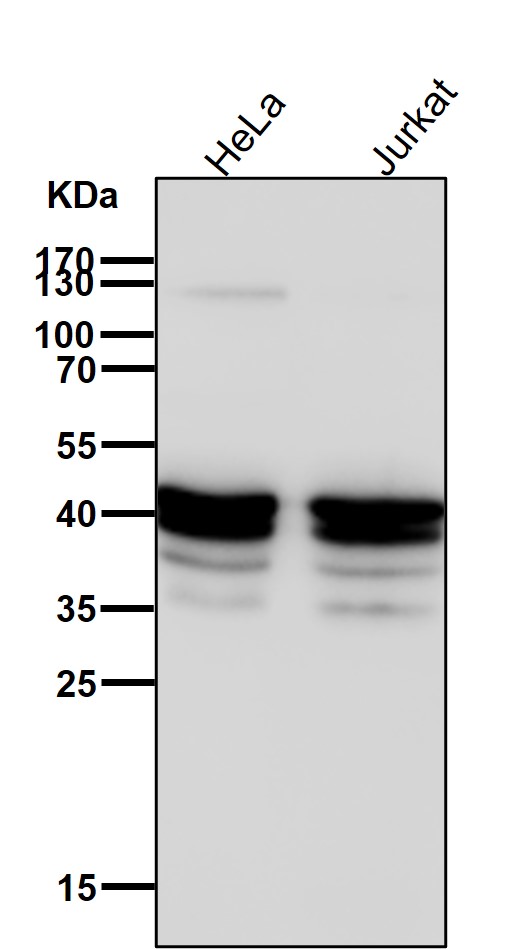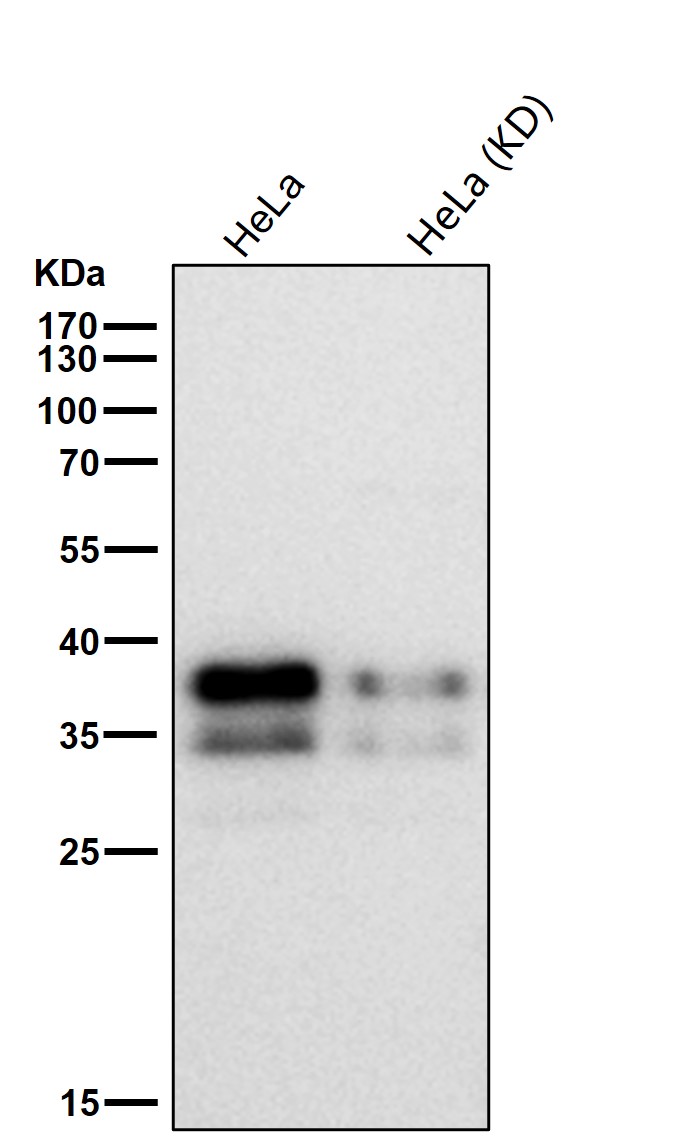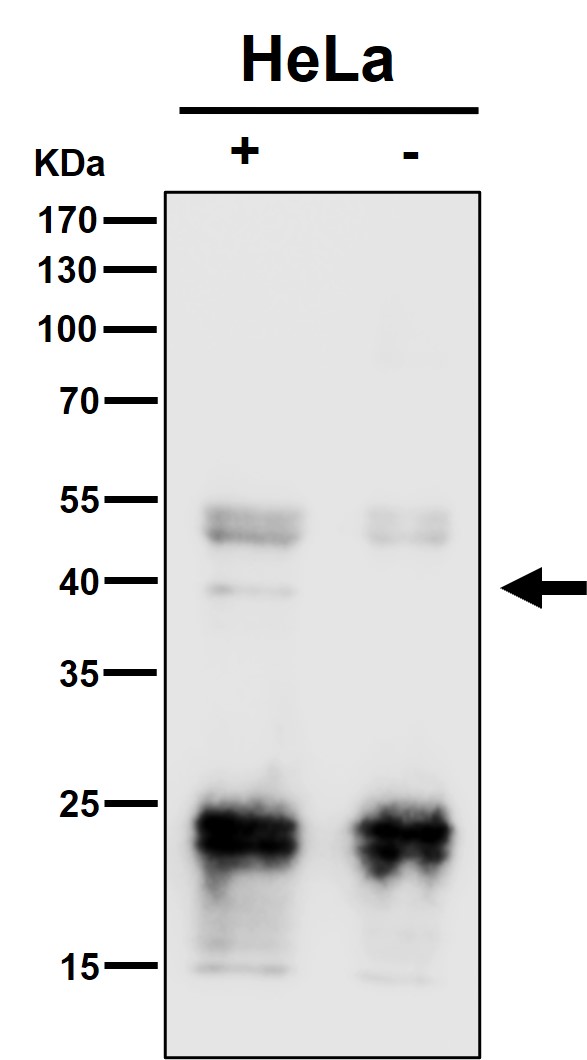



| WB | 咨询技术 | Human,Mouse,Rat |
| IF | 1/20-1/50 | Human,Mouse,Rat |
| IHC | 咨询技术 | Human,Mouse,Rat |
| ICC | 1/50-1/200 | Human,Mouse,Rat |
| FCM | 咨询技术 | Human,Mouse,Rat |
| Elisa | 咨询技术 | Human,Mouse,Rat |
| Aliases | Alpha CP2; Cbp; CTBP; hnRNP E2; Hnrnpx; HNRPE2; Hnrpx; PCBP2;;PCBP2 |
| WB Predicted band size | Calculated MW: 39 kDa ; Observed MW: 35,39 kDa |
| Host/Isotype | Rabbit IgG |
| Antibody Type | Primary antibody |
| Storage | Store at 4°C short term. Aliquot and store at -20°C long term. Avoid freeze/thaw cycles. |
| Species Reactivity | Human,Mouse,Rat |
| Immunogen | A synthesized peptide derived from human PCBP2 |
| Formulation | Purified antibody in PBS with 0.05% sodium azide,0.05% BSA and 50% glycerol. |
+ +
以下是关于PCBP2抗体的3篇参考文献示例(内容基于学术文献的典型研究方向,建议通过数据库验证具体信息):
---
1. **文献名称**:*PCBP2 regulates hepatic iron homeostasis through modulation of hepcidin expression*
**作者**:Kühn, L.C., et al.
**摘要**:本研究揭示了PCBP2通过结合铁代谢相关mRNA调控肝脏铁调素(hepcidin)的表达。作者使用PCBP2特异性抗体进行免疫沉淀,证实其在铁离子稳态中的直接作用,并发现PCBP2缺失会导致铁过载表型。
2. **文献名称**:*PCBP2 interacts with the RNA genome of hepatitis C virus and promotes viral replication*
**作者**:Wang, T., et al.
**摘要**:通过免疫共沉淀(Co-IP)和蛋白质-RNA结合实验,研究发现PCBP2与丙型肝炎病毒(HCV)RNA基因组结合,促进病毒复制。PCBP2抗体的应用揭示了其在病毒生命周期中的关键调控机制。
3. **文献名称**:*PCBP2 suppresses tumor progression by inhibiting oncogenic alternative splicing*
**作者**:Shi, Y., et al.
**摘要**:该文献证明PCBP2作为肿瘤抑制因子,通过调控癌基因的选择性剪接抑制肿瘤生长。Western blot和免疫组化实验中使用PCBP2抗体显示其在多种癌症组织中表达下调,与患者预后相关。
---
**提示**:以上信息为示例,实际文献需通过PubMed、Google Scholar或Web of Science搜索“PCBP2 antibody”或“PCBP2 function”获取。部分研究可能侧重于PCBP2的分子机制而非抗体本身,建议结合具体实验需求筛选文献。
**Background of PCBP2 Antibody**
PCBP2 (Poly(rC)-Binding Protein 2) is a member of the heterogeneous nuclear ribonucleoprotein (hnRNP) family, known for its RNA-binding activity and involvement in post-transcriptional gene regulation. It interacts with poly(rC)-rich regions in RNA, playing roles in mRNA stability, translation regulation, and alternative splicing. PCBP2 also participates in cellular processes such as iron homeostasis, viral replication, and stress response.
The PCBP2 antibody is a critical tool for detecting and studying this protein in various biological contexts. Researchers use it to investigate PCBP2's role in cancer, where it may act as both a tumor suppressor and promoter depending on cellular context. For example, PCBP2 is implicated in regulating oncogenic signaling pathways (e.g., PI3K/AKT) and has been linked to malignancies like hepatocellular carcinoma and glioblastoma. Additionally, studies utilize this antibody to explore PCBP2's interaction with viral RNAs (e.g., enteroviruses, hepatitis A virus) and its impact on viral life cycles.
Validated in assays such as Western blotting, immunohistochemistry, and immunofluorescence, the antibody aids in elucidating PCBP2's subcellular localization (primarily nuclear and cytoplasmic) and expression patterns across tissues. Its specificity and reliability make it essential for advancing research in RNA biology, cancer mechanisms, and host-pathogen interactions.
×